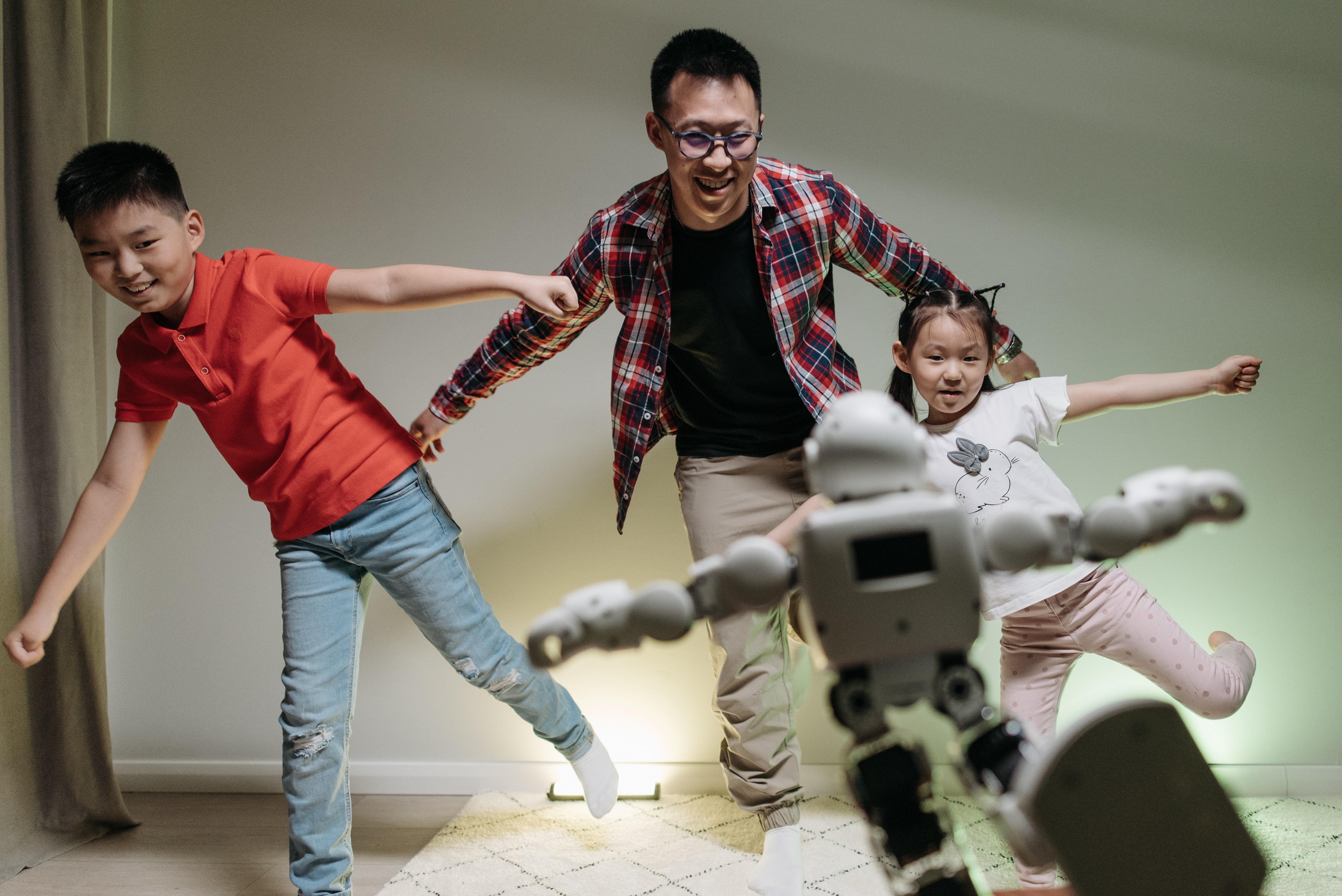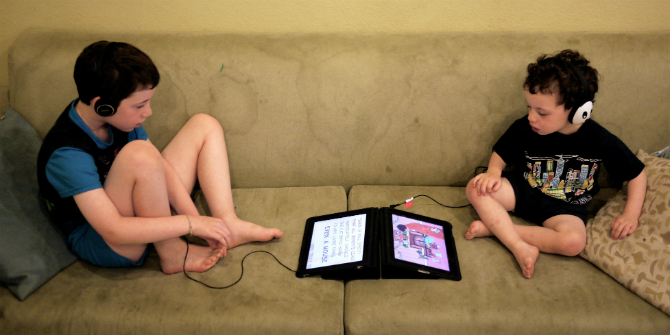Many children enjoy playing video games, yet they offer distinct challenges and opportunities arising from their ability to tell stories, invite participation, create imaginary worlds and connect players. Andy Robertson outlines how parents, by taking a more holistic approach, can develop their own video game literacy and guide their children towards a healthy video game experience. Andy is a freelance journalist specialising in video games for families. He writes for national newspapers and broadcasters. [Header image credit: Andy Robertson]
Over the years reporting on video games, I have interviewed, visited and documented how hundreds of parents deal with video games in the home. They present a unique challenge, even in the already complex digital world, because of their interactive storytelling, provision of social encounters and reimagining of existing media. These challenges must be met holistically so that games no longer fall between policy gaps and parents get the guidance they need.
Much of the debate about the dangers of video games is triggered from polarising press reports. While many side either for or against, the reality for parents is multifaceted. On one hand parents can be suspicious of their children’s gaming habits and the drive of corporate developers to turn a profit. On the other, they see the joy and benefits their children find in this hobby and want to embrace this instinct for fun.
Of late, the most common response has been ‘screen time’ limits, to allay parent’s fears and quantify excess. This can provide a good starting point, but as previously established is a muddled and misguided measure. To really help we need to develop language and a holistic understanding that addresses the more complex reality of raising children who play a lot of video games.
The specific challenge of understanding video games
Pinpointing this kind of advice is particularly challenging for video games because they straddle a number of areas of digital life and are evolving rapidly. Games present unique benefits and pitfalls arising from their ability to tell stories, invite participation, create imaginary worlds and connect players.
Because of this they are often missed out of advice and policy for digital life. For instance the UK government’s 2017 Green Paper on internet safety, offered a comprehensive plan for parents. However, while it included a section on video games, highlighting the excellent work of the VSC and AskAboutGames initiatives, there was no specific mention of video games in the section of the report addressing how to support parents.The report promised that the “DCMS will ensure that targeted information about young children and technology is available to new parents”, but little was said about developing understanding and skills to help parents navigate video games as children mature.
This absence is all the more concerning with figures pointing to games like Roblox as the first place children are likely encounter online interactions with strangers. OFCOM’s Children and Parents: Media Use and Attitudes Report 2017 stated that no 3-4s in the study and only 3% of 5-7s had a social media profile, whereas 12% of 3-4s and 24% of 5-7s played online games. This earlier adoption was reflected in later habits too, with 13% of all 8-11s and 17% of all 12-15s talking to strangers in the games they played.
Later in the report it highlights that “the Roblox site, which hosts a popular children’s multi-player online game of the same name, and can also be used as a social gaming platform where players can chat with each other, was the third most-visited site by children in May 2017.”
Understanding video games holistically
The success of Pokemon Go, that Kiley Sobel wrote about, is another example of a popular game not well understood beyond generic digital media measures. Sobel helpfully identified how the game used the six conditions that help families come together with digital media – mutual engagement, dialogic enquiry, co-creation, boundary crossing, intention to develop and focus on content.
However, to help parents understand this successful experience to help them find other video games, we also need to consider how its specific game-y-ness created its cultural moment and popularity.
Pokemon Go not only got children out into the real world to catch Pokemon, but created a virtual world of its own that received players into a narrative built out of battle interactions, exploration, discovery and hidden meaning. It’s in this encounter with a new world, that combines many storytelling, interactive and visual elements that we can grasp what the game is ‘doing’ to players. Understanding how different games create these kinds of spaces, and invite and receive players into them, is essential to accurately perceive benefits and dangers.
It’s this kind of gaming literacy that will enable parents to understand what their children are doing on their gaming screens and why it is so compelling. This can move parents beyond knee-jerk screen-time limits, to having in-depth conversations with their children about the games they play.
Parenting resources that build video game literacy
There are many ways for parents to develop this kind of understanding. Talking to their children who are playing games, and listening to their answers offers an excellent resource. This can lead to parents being present during gaming time to see first hand what their child is doing. Parents playing games themselves is also an important, and often unpopular, suggestion. Helping parents find ways to access the world of games, and combat their self confessed disinterest of video games, is important.
There are a range of resources that can help here. I aim to help with my book, Taming Gaming, which provides parents with a succinct overview of what games are, why they are popular and how they are distinct from other digital (and analogue) media. The book enables parents to find games for themselves and their children with simple “gaming recipes” that identify the best ages for the game, what “technology ingredients” are needed to play it, how long it will take and a short method to get families started. The recipes also provide “serving suggestions” of how other families have enjoyed the games together, and conversations they have sparked. Similarly, my Patreon project offers weekly videos and advice for parents to introduce them to games they are more likely to enjoy.
This approach to developing support for holistic video game literacy is on the rise elsewhere. The recently formed British Games Institute, a new national games agency delivering a range of programmes for cultural games production and games as culture projects, has a number of initiatives. It recently merged with the National Video-Game Archive (NVA), which offers a visitor centre in Nottingham to help parents gain confidence, understanding and knowledge about what video games offer them and their children.
The NVA have recently released a book A History of Videogames that tells the story so far through physical objects. As well as this long-term work there are more immediate opportunities to help parents move on from screen-time worries and guide their children to a broader and healthier ‘diet’ of games. There are excellent museum exhibits such as the Videogames: Design/Play/Disrupt at the V&A, or the long standing Game Masters touring exhibit, current at the Franklin Institute, and Game On. Like the NVA book, these exhibits grant access to the world of games with physical objects and hands-on experience set in a framework of how they have developed over time.
These resources, coupled with a holistic understanding of what video games are, enables parents and policy makers to guide children to benefit from their many positive opportunities. It also ensures that dangers and challenges are understood in context and advice is similarly nuanced.
This post gives the views of the authors and does not represent the position of the LSE Parenting for a Digital Future blog, nor of the London School of Economics and Political Science.






